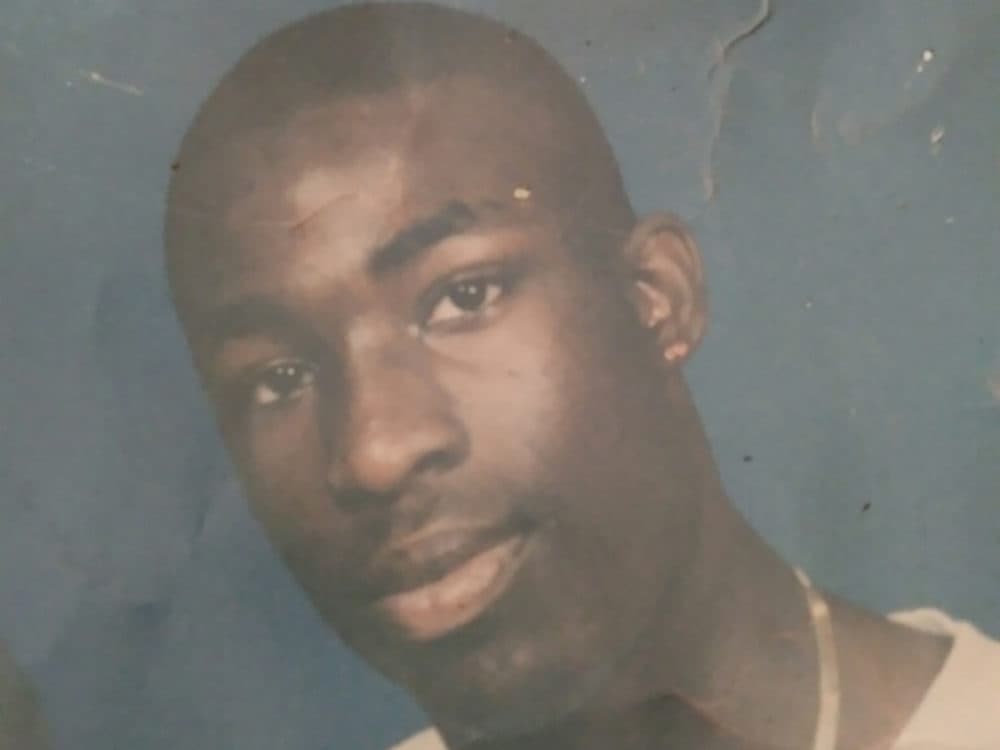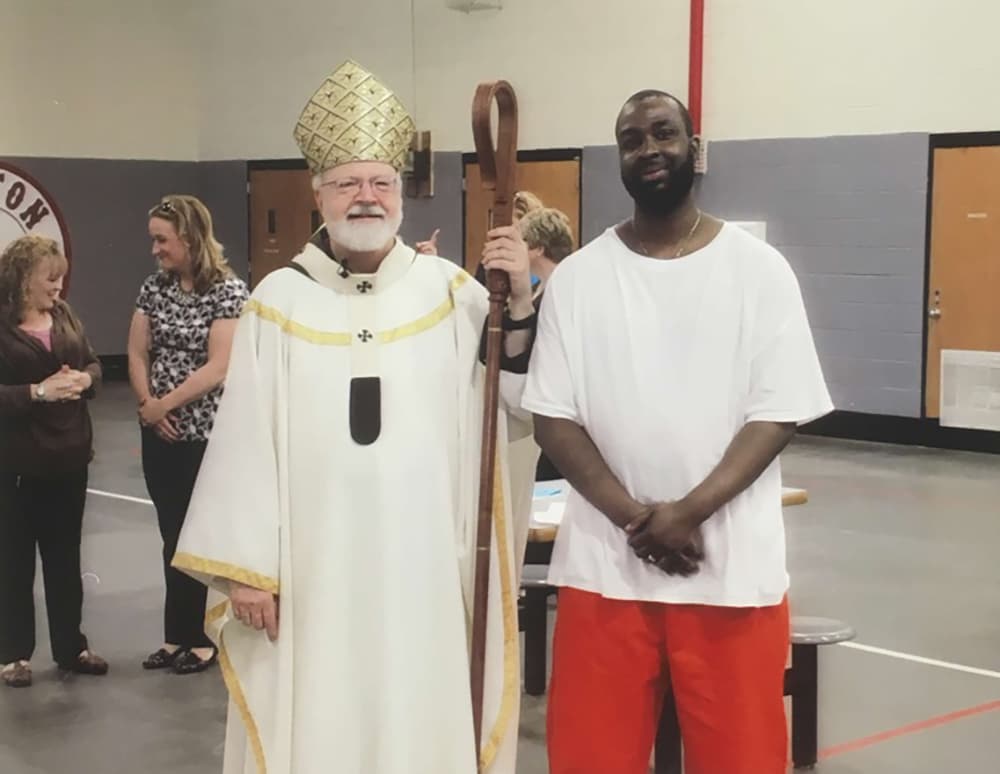Advertisement
Coronavirus Coverage
Charlie Baker Has Never Commuted A Prison Sentence. Lawyers For William Allen Hope His May Be The First

While it is possible for a prisoner to be granted clemency in Massachusetts, it rarely happens. The last time a prisoner's sentence was commuted in Massachusetts was in 2014, and that was the first commutation in 17 years.
The state Supreme Judicial Court is among those urging Gov. Charlie Baker to use his executive powers to release prisoners because of the coronavirus pandemic, but he hasn't commuted a sentence or pardoned a prisoner in his five years as the state's chief executive.
Attorneys for William Allen know this, but they've filed a supplement to Allen's petition seeking a commutation. Among their arguments is that laws have changed and Allen would not receive a life sentence for the same crime today. They also argue he has proven to have been rehabilitated in his more than two decades behind bars, that a new psychological assessment deems him to be 'low risk,' and his medical issues make him particularly vulnerable to COVID-19.
"Statistically speaking, it is the longest of long shots," says Patty Dejuneas of Sibbison, DeJuneas & Allen LLP, one of the attorneys representing Allen. "But William's petition is so strong and with the need to decrease the prison population, I think that if anyone deserves a second chance, it's William."
Allen was convicted in 1997 of armed robbery and felony-murder as a "joint venturer." That means Allen participated in the armed robbery which led to the murder, but another man was the killer. That man, Rolando Perry, accepted a deal to plead guilty to second-degree murder charges and was released on parole 11 years ago. Allen refused the plea deal.
This is one of the most compelling cases I've ever run into, probably the most.
Former SJC Justice Robert Cordy
Retired state Supreme Court Justice Robert Cordy, who is now a partner in the law firm McDermott, Will and Emery, is among those arguing Allen should be released.
Cordy says this is the first time he's ever advocated for a prisoner, and is doing so because the case is so unique, citing a 2017 SJC ruling that narrowed the rules for felony-murder joint venture cases like Allen's.
"The SJC has redefined felony murder, and this case literally could not be prosecuted today as a felony murder case, and Mr. Allen would not be sentenced to life in prison without the possibility of parole," Cordy says.
Cordy also says a neuropsychologist examination indicates that Allen is at "low risk' to reoffend. Allen has a place to go and can live with his family. Cordy adds Allen has had an exemplary record while incarcerated.
"Everyone who has come to know him has tremendous respect for him, and you just don't see that kind of thing," Cordy says. "This is one of the most compelling cases I've ever run into, probably the most."
Advertisement
Allen's commutation petition says he has participated in several restorative justice programs, was chosen to work as a mentor for mentally ill prisoners, obtained a barber's license and serves as a Eucharistic minister and altar server. The petition includes almost two dozen letters of support, including one from retired prison chaplain Peg Newman. She says Allen has changed since he was convicted at age 20.
"Many men convicted of felony murder never let go of the fact that they think it's wrong they've been convicted," Newman says. "But Will was able to get past that — he was able to accept responsibility that he was involved in a very horrible crime, and he didn't get stuck holding on to the anger."

Allen first filed a petition for commutation in 2017, but the Massachusetts parole board never acted on it. His attorneys say they filed the supplemental petition Tuesday for several reasons: to update the parole board and to ask for consideration because of the coronavirus pandemic. They say Allen's underlying health issues — which include asthma, lupus and liver disease — make him susceptible to complications from COVID-19.
"With no vaccine on the horizon; no widely-available effective treatments; a high statewide death rate; and the expected return of the virus in the fall and winter of 2020, the threat to William's health is not likely to end anytime soon," the petitioners write.
The supplemental petition includes a Superior Court judge's ruling on Allen's motion for release because of the pandemic. While Judge Debra Squires-Lee denied Allen's request, she did comment on his letters of support.
"Giving those letters full credit, it appears that Allen may be a good candidate for commutation of his sentence. But that power is not mine," Squires-Lee wrote in her decision. "It is exclusively the power of the executive branch, and the SJC has already urged the executive branch to 'contemplate how it best might exercise those powers to mitigate the spread of COVID-19 in the Commonwealth's prison system.' "
The SJC issued that ruling in April, pointing out that the executive branch could cut through some of the legal red tape and quickly reduce the number of people incarcerated in Massachusetts by commuting sentences or allowing early parole.
There are more than 300 requests to the state for clemency, with more than 200 petitioners seeking pardons and more than 100 petitioners seeking commutations. A pardon would mean forgiveness of the offense, while a commutation reduces a prison sentence.
The state Executive Office of Public Safety and Security says the state has taken steps to reduce the prison population. The parole board has issued 500 release permits in the past seven weeks, and hundreds of prisoners have been let out.
"State criminal justice agencies will continue to protect the public safety, review each case on its merits, and work with our partners and stakeholders as we confront this unprecedented global health crisis," says the statement from EOPSS spokesman Jake Wark.
Baker did issue revised guidelines for executive clemency in February. Those guidelines allow petitioners to submit new information to their requests.
"The Governor views commutation both as an extraordinary remedy and an integral part of the correctional process," according to the revised guidelines."Review of a petition for commutation of sentence is not intended to serve as a review of the proceedings of the trial or appellate courts, or of the guilt of the petitioner. It is intended to serve as a strong motivation for confined persons to utilize available resources for self-development and self-improvement and as an incentive for them to become law-abiding citizens and return to society."
I'm a firm believer in second chances. I think it's very unfortunate that more of them haven't come forward in the last couple of years.
Governor's Council member Terrence Kennedy
Kristine McDonald, another attorney working on William Allen's commutation, said his case could set an example.
"The governor's guidelines are, I think, a pretty powerful statement of our values in Massachusetts and they set out a standard which our client meets pretty squarely," McDonald said. "Commuting William's sentence would set the perfect example of saying, 'if you want your sentence commuted, here's an example of what you need to do.' "
In Massachusetts, clemency is a three-pronged process. Before the governor reviews a commutation request, the parole board weighs in. The board will hold a hearing on a request if it considers it warranted, and will then make a recommendation to the governor. If the governor and parole board approve, the request must also be supported by the Governor's Council.
Some members of the Governor's Council say they've been asking why the group hasn't received any petitions for clemency from Baker.
"I bring it up constantly," says councilor Terrence Kennedy. "I'm a firm believer in second chances. I think it's very unfortunate that more of them haven't come forward in the last couple of years. We are certainly ready, willing and able to entertain any commutations on very short notice."
The last time a sentence was commuted in Massachusetts was in 2014, when Gov. Deval Patrick, who was about to leave office, commuted the sentence of Deanne Hamilton. That was the first commutation in the state in 17 years.
New York University researchers have been tracking executive clemency powers and say governors in other states have issued reprieves because of the pandemic. NYU Law School Center on the Administration of Criminal Law issued a report last year titled "Willie Horton's Shadow: A History of Clemency in Massachusetts." Willie Horton was serving a life sentence but did not return to prison when he was furloughed in 1987. He was then convicted of assaulting a man and raping the man's fiancée. That happened while Gov. Michael Dukakis was in office, and it became a major issue when Dukakis ran for president in 1988.
The NYU report says in Massachusetts, the governor's use of clemency or "discretionary release " started to drop in the 1980s — and steeply dropped after Willie Horton.
"Discretionary release has yet to recover," the report says. "Without a realistic opportunity for clemency, more than 1,000 individuals serving life-without-parole sentences in Massachusetts — are condemned to die behind bars."
This segment aired on May 27, 2020.
